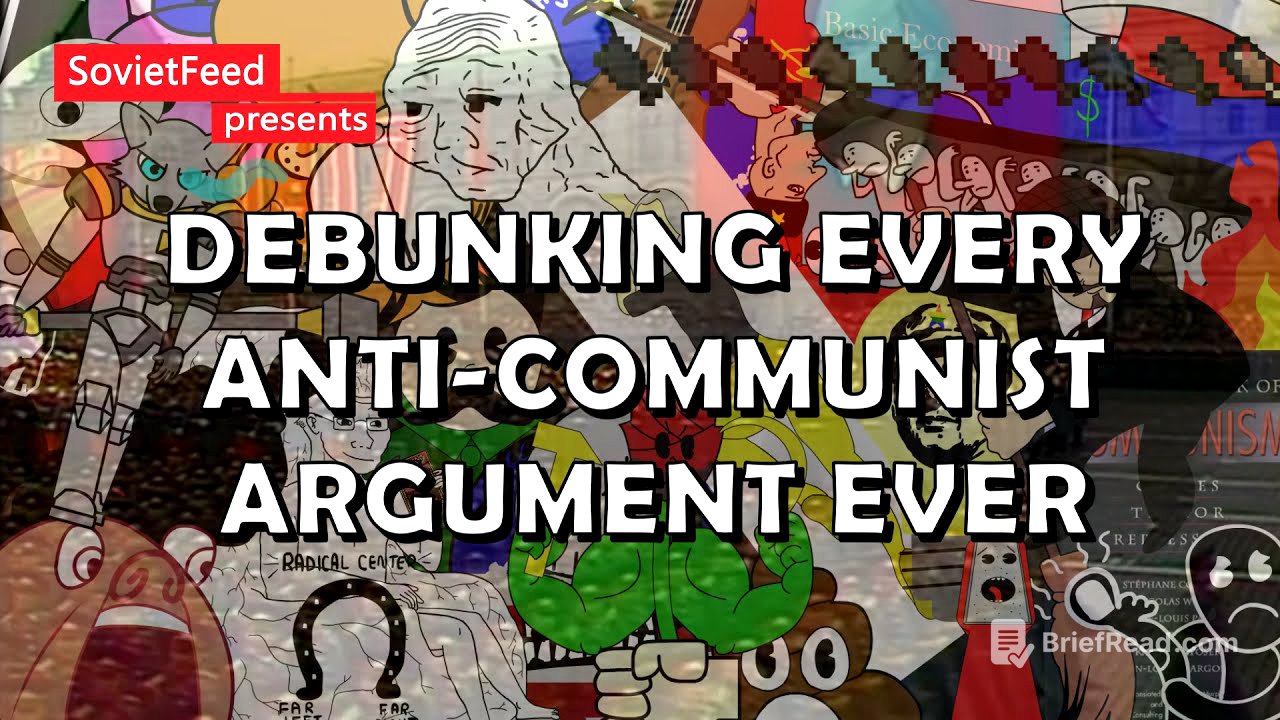TLDR;
This video addresses and debunks common anti-communist arguments. It challenges misconceptions about socialism and communism, counters claims about historical death tolls and famines, and critiques the notion that communism is inherently authoritarian or economically unviable. The video also explores the reasons behind the prevalence of anti-communism and encourages viewers to critically examine their own biases.
- Socialism is not when the government does stuff.
- Communism doesn't mean a hivemind dystopia.
- Death tolls under communism are often exaggerated.
- Anti-communism is often rooted in the protection of property owners' interests.
Introduction [1:22]
The video aims to address common anti-communist arguments that are frequently repeated, particularly online. It targets individuals who recognize the flaws of capitalism but are hesitant to support communism or socialism due to ingrained misconceptions. The goal is to debunk these arguments and foster a more informed discussion.
Socialism is when the government does stuff [2:45]
The idea that socialism is simply when the government does things is a misconception. This argument incorrectly equates government functions like libraries, the military, and prisons with socialism. Socialism is defined as common ownership of the means of production, distribution, and exchange. Communism is a stateless, classless, and moneyless society with common ownership of the means of production.
Communism would create a hivemind dystopia! [4:36]
The idea that communism would force everyone to become part of a hive mind is a common misconception. Instead, communists aim to free the masses to unleash their suppressed talents. Historically, socialist revolutions have led to a flourishing of art, culture, and creativity. In contrast, capitalism often prepares students for a lifetime of work as mindless drones, reserving excitement and interest for the rich and powerful.
Communism killed 100 bazillion people! [5:50]
Claims about the death toll of communism are often overblown and exaggerated. Studies examining archival evidence from the Soviet Union have found that previous estimates were based on guesses, rumors, or extrapolations. Many of the high figures come from sources like "The Black Book of Communism," which deliberately inflated numbers. This conversation often ignores the millions of deaths under capitalism from poverty, hunger, exposure, and imperialist war.
Animal Farm [7:07]
George Orwell's "Animal Farm" has significantly influenced anti-communist discourse. The book is a fictional allegory of the Soviet Union that ignores the material realities the country faced, such as the invasion of capitalist nations. Orwell himself was a racist and snitch who reported communists to the secret police. Learning history from a fairy tale is not a substitute for actual historical analysis.
No food lol [9:17]
The claim that communist countries always experience famines is a common mocking point. However, after initial famines, countries like the Soviet Union and China achieved food security for the rest of their existence. Studies have shown that socialist countries often had a higher daily per capita calorie supply, lower child death rates, higher life expectancy, and better access to education and healthcare compared to capitalist countries.
Commies wanna take my stuff? [11:24]
The idea that communists want to take away everyone's personal property is a misunderstanding. Communists advocate for the abolition of bourgeois property, which refers to things used to make more money and give power to those who own them, such as factories, banks, and infrastructure. They do not seek to take away personal possessions like toothbrushes.
Won’t equal pay discourage innovation? [12:28]
The argument that equal pay under communism would discourage innovation misunderstands the concept. Socialism doesn't mean everyone is paid the same, but rather that everyone has common ownership of the means of production. There are many incentives for humans besides money, such as survival, passion, and the desire to better others' lives. Historically, socialist countries have demonstrated significant innovation, such as being the first to go to space.
But what about human nature tho? [14:27]
The claim that communism will never work because of human nature, which is supposedly greedy and lazy, is a common argument. However, there are many other incentives besides money, such as survival, passion, and the desire to better others' lives. Human nature is not static but is shaped by the mode of production.
Beat it and move to North Korea with you iPhone, commie scum! [15:36]
The argument that socialists should move to North Korea or that owning an iPhone makes them a hypocrite is a tactic to shut down discussion. This argument doesn't address the actual ideas of socialism and serves only to attack the person. It's impossible to avoid participating in capitalism to some extent, so criticizing the system isn't inherently hypocritical.
Horseshoe Theory [17:33]
Horseshoe theory, which claims the far left is as bad as the far right, ignores deep analysis of communism and fascism. Fascism is closer to capitalism than communism. Fascism began when capitalists needed to revitalize profits and suppressed communist parties and labor unions.
Communism always results in a totalitarian dictatorship! [19:01]
The idea that communism inherently leads to totalitarian dictatorship is misleading. Authoritarian measures in communist states often developed after capitalist attempts to crush them. Capitalist powers have a history of invading and destabilizing countries that try to move beyond capitalism. The totalitarianism of communism is not a natural development but an unnatural one caused by capitalist terrorism.
Communism takes away political rights! [21:15]
The argument that communism takes away political rights often ignores the fact that many countries that became communist had little democracy before. Capitalists are willing to virtually signal political rights and liberties but will brutally crush communist regimes if people actually support them. The overthrow of communism often involves the suppression of political rights and the rigging of elections.
Lol commies are bad with economics [23:12]
The stereotype that communists are bad with economics is often based on the fact that many communist countries faced decades of underdevelopment and exploitation before communism arrived. Communism rebuilt these countries, leaving them in better shape. In contrast, capitalism has destroyed the economies of former communist nations.
Fall of communism [24:47]
The fall of communism in the Soviet Union and Eastern Europe was a crime for capitalism. Since then, the United States and capitalist powers have attacked and invaded various countries. The social democracy in Scandinavia was strong because communism was around the corner. The fall of communism doesn't prove it doesn't work but ignores the fact that it did work by providing essential services and a reliably growing economy.
YOU’RE JUST SOME LAZY COMMIE LOL TALK TO ANYONE WHO LIVED UNDER COMMUNISM [26:33]
Modern-day communists are often stereotyped as lazy and good-for-nothing. However, communists come from all backgrounds and are often from marginalized groups. Many people who lived under communism actually want it back. Polls show that majorities in many former communist countries believe its collapse harmed their countries.
My grandparents’ slaves were taken by communism! [28:52]
This chapter is a joke.
My friend who fled communism said it sucked [29:01]
This chapter is a joke about survivorship bias.
You’re not a real communist, you’re just thirsty for Stalin’s bussy [29:11]
This chapter is a joke.
Vuvuzuela [29:32]
Venezuela's economic struggles are due to the collapse of oil prices, a staple of capitalist markets, and U.S. sanctions. Despite the economic chaos, the people of Venezuela still support the Bolivarian Revolution. The corporate media is working overtime to spread misinformation about Venezuela.
Why is anti-communism so prevalent? [31:15]
Anti-communism is prevalent because communism is a threat to property owners. Ruling interests have propagated anti-communist doctrine for centuries. During the Cold War, the anti-communist ideological framework could transform any data about existing communist societies into hostile evidence. Capitalist realism, the sense that capitalism is the only viable system, also contributes to anti-communism.
Conclusion [34:09]
The video acknowledges its own bias but argues that everyone has biases. Skepticism should be applied to all claims, not just those that challenge one's worldview. The video encourages viewers to stop and listen to real communists rather than relying on straw man arguments.
End Card [36:20]
The video recommends resources for learning more about communism, including podcasts, YouTube channels, and reading theory. It also encourages viewers to support current uprisings and prioritize class warfare over national war.
Parenti [38:47]
The video concludes with a quote from Michael Parenti, emphasizing that life was better in Cuba, where there was less poverty and misery, than in the richest country in the world, where people sleep in doorways and struggle to survive.









